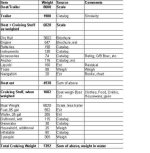Bob,
Yes, I WISH I had an aluminum trailer, especially going South on the Grapevine in 2nd gear and sometimes 1st! I tried desperately back in 2002 to find a mfr here on the West Coast. Pacific was working on one, but not that capacity, about 2005 they did come out with one rated high enough, I saw it at a boat show, beautiful design!
I rechecked my records, my boat/trailer combo back in 2005 weighed 7,440 lbs not 7,400 (hey, sometimes a few pounds means something). And I probably had 95 gals of gas. When I first filled it from a known empty tank it held 99.5 gal I believe, but had expansion problems as our weather warmed up. So since then I fill till it begins to slurp or whatever the sound is when the in-going gas begins to hit the vent tube hole at the top of the tank. Leaves about 5 gal of free space, just right.
However, I really like my trailer being over-rated, albeit, maybe a bit heavier than others, but it rides well and it takes rough roads very well and stable. It is rated at 9,480 lbs GVWR, fully galvanized with 6" C channel construction, a full-size spare, and 4-wheel SS disc brakes. I upped the tires from load range D to E on the recent re-tire, they are ST225 R75x15.
My toilet is a SaniPotti with the 5 gal tank, bracketed to the floor of the bathroom, weighs about 20 lbs with just the fresh water in it.
I watch the weight of 'stored' items on board regularly, a carry-over from my trimaran days (right Jim? ha). But when I take 2-3 people's worth of scuba gear for a w/e trip, all that weight concern gets thrown out the window...

